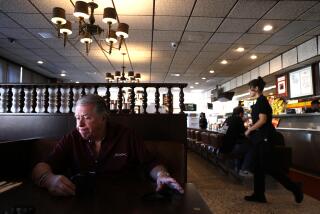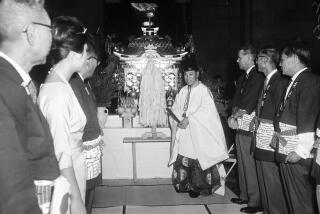Soviet City Plays Hard to Get : U.S. Municipalities Court Elusive Leningrad
- Share via
The courtships leading up to municipal marriages do not always go smoothly.
Take, for example, the Philadelphia Story and its would-be remake, the Los Angeles Story, which never got out of development.
For six years now, Philadelphia has been wooing Leningrad.
Civic leaders have sent prized books and distinguished delegations to Leningrad, invited Leningrad’s famous Kirov Ballet to Philadelphia and eloquently set forth the logic of pairing the seat of American independence with the seat of the Russian Revolution.
Citizens have established their own nonprofit corporation and raised tens of thousands of dollars in dowries. Not that there were not some selfish motivations. Philadelphia arts patrons, for example, had their eyes on certain Rembrandts that reside in Leningrad.
There is even a certain grammatical symmetry to the match. Philadelphia is the City of Brotherly Love. In Russian, sister city programs are called Brother City Programs.
Then a love triangle emerged.
Seemed an Ideal Match
Leningrad began courting San Francisco, home of the Russian Hill and the only Soviet Consulate in the United States outside Washington. It too seemed an ideal match, a union between cities that many consider the beauties of their nations.
They even have bridges in common. Leningrad, called the Venice of the North, is a city of islands linked by bridges. And, of course, San Francisco has its Golden Gate.
“It was nip and tuck for a while between us and San Francisco and we were told that whoever could deliver their mayor would get the nod,” said Dr. H. Fred Clark, president of the Philadelphia-Leningrad Sister Cities Project.
Often citing human rights concerns, many mayors and council members have been unwilling to sign the controversial sister city ties with the Soviet Union.
Mayor Wilson Goode of Philadelphia has yet to come out in support of the idea. Clarke said he prefers official silence on the issue to an official no.
Meanwhile, San Francisco Mayor Dianne Feinstein traveled to the Soviet Union in 1985, and was wined and dined in Leningrad. She and Leningrad’s mayor emerged from a private tete-a-tete and announced their civic engagement.
But it was not to be.
When Feinstein came home announcing her triumph, she was lambasted by Assemblyman Art Agnos, a fellow Democrat. Agnos had been arrested in Leningrad in 1984 after meeting with Soviet Jews and dissidents during a wave of repression in the city.
Feinstein, herself a Jew who had been instrumental in the release of 36 Russians seeking to emigrate, accused Agnos of “loud panderings to the Jewish community.”
The debate raged on in the press until Feinstein called off the wedding.
“No one wants a sister city relationship in the midst of controversy,” she said.
Leningrad, it was rumored in sister city circles in the United States, had been shunned and embarrassed and would not welcome other proposals.
Discreet Inquiries
Then, last May, another potential suitor made discreet inquiries.
Bee Canterbury Lavery, Mayor Tom Bradley’s chief of protocol and, until a few weeks ago, his sister cities liaison, spoke with the Soviet office in charge of sister cities to see if Leningrad was still available.
She said last month that a sister city relationship with Leningrad “has been proposed.” Sister Cities International official Thomas W. Gittens said he had received news of the inquiry as well.
But a spokesman for Bradley denied this week that there ever was any “proposal.” Busy with earthquakes and other issues, the mayor declined an interview on the subject of sister cities.
Lavery, asked again about the proposal, denied that her overture constituted a “proposal.” It was only an “informal inquiry about any Soviet sister city, which has been mentioned here occasionally for years,” she said.
Bradley, apparently, learned from Feinstein’s mistake.
Michelle Krotinger, a spokesman for City Councilman Zev Yaroslavsky, said the mayor had contacted Yaroslavsky’s office in June, asking for feedback from the Jewish community about the idea.
“We got a letter from the Commission on Soviet Jewry here saying that it was not in our best interests to pursue it and the process was terminated at that point,” Krotinger said.
Ironically, Myrna Shinbaum, associate director of the National Conference on Soviet Jews in New York, said in an interview that it is not necessarily a foregone conclusion that the national conference would oppose any pairing with Leningrad today.
“When this was proposed in San Francisco, Soviets were beating up on American tourists and Soviet Jews were being arrested,” she said. “We do recognize some improvements.”
Moscow has allowed more emigration of Soviet Jews, she said, and has released some political prisoners.
‘Ought to Have Forum’
“Our position across the board is that we recognize cultural and educational exchanges when done in the spirit of the Helsinki (human rights) Accord,” she said. “But people ought to have a forum in any exchange to bring up concerns which divide, as well as unite, Soviets and Americans.”
Such affiliations should be decided, she said, on a case-by-case basis with local input from the Jewish community.
Meanwhile, Philadelphia is patiently waiting and wooing in the wings.
“I heard Boston and St. Petersburg (Fla.) were after Leningrad too,” Clark said. “This is a romantic notion, but it’s not very romantic in being carried out.”
More to Read
Sign up for Essential California
The most important California stories and recommendations in your inbox every morning.
You may occasionally receive promotional content from the Los Angeles Times.













